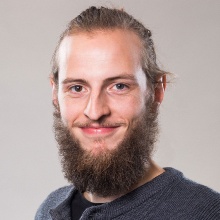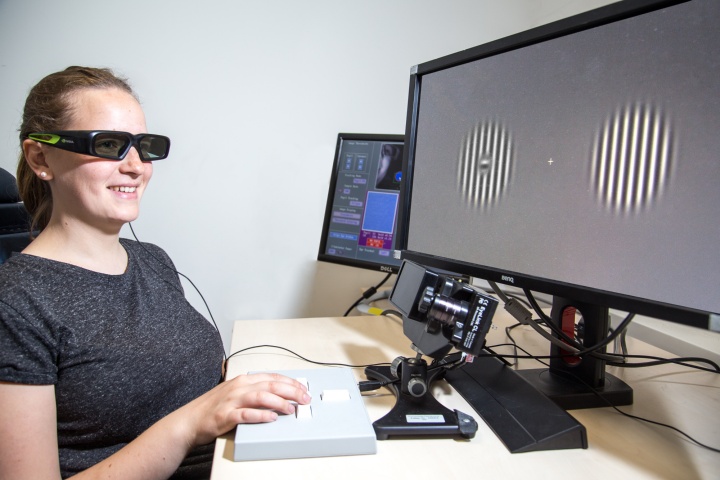Benedikt Ehinger describes himself simply as a brain researcher. Expressed in somewhat more scientific terms, the fields incorporate visual cognitive science, behavioral, electroencephalographic and eye-tracking experiments and statistical modeling. Ehinger’s focus is on vision – from eye movements to the blind spot. Eye movements are the kind of movement which a person performs most often – more than 100,000 times a day. The impact of these movements on vision and brain activity are enormous. For example, the movement of an eye from the desk to the outside causes a complete change in what we see. “That has fascinated me for a long time, and I want to gain a deeper understanding of the cause and effect of eye movements on the brain”, says Ehinger, describing his research interests. “You have to look at brain activity during the eye movement as well, and that’s the interface I’m working at.”
Following on from this Ehinger spends a lot of time working with statistical methods, in particular regarding brain waves. These very small brain waves are difficult to measure and interpret, but make it possible to gain an extremely varied and unique insight into the way the brain functions. In his laboratory, Ehinger will first develop a methodologically sound basis for analyzing brainwave data using eye movements and other movements (e.g. moving pictures but also moving arms, legs etc). In this way, the methodologies are to be combined with cognitive models.
“Ehinger uses his measurements of focal points and brain waves to combine experimental approaches which generate a lot of data with statistical modeling of the underlying cognitive processes, and represents an example of data-integrated simulation science”, stresses the spokesman of the Cluster of Excellence “Data-Integrated Simulation Science” Prof. Thomas Ertl in his welcome address for the new SimTech professor. “In Benedikt Ehinger, we have gained the services of an outstanding early career researcher for the University of Stuttgart, who will enhance the research carried out in the SimTech Cluster of Excellence in the Adaptive Simulation and Interaction project network.”
Ehinger himself also considers SimTech an attractive environment. “SimTech is very strong in the area of data science and of course in simulation. You get large amounts of data very quickly with brain measurements, and simulations of realistic brain wave experiments are even more complex”, says the scientist, whose most recent position was at the Donders Institute in the Netherlands. “Here we rely more on cognitive models, which are ultimately also a (strongly simplified) simulation of the person. Combining both fields together is very exciting and promising.”
About Benedikt Ehinger
Benedikt Ehinger was born in 1989 in Upper Swabia and studied cognitive science in Osnabrück. In 2018 he began a postdoc in the Predictive Brain Lab at the Donders Institute for Brain, Cognition and Behaviour in the Netherlands, a research institute for cognitive neurosciences. In 2019 he was awarded the Inpjin-Bakker-Grundwald prize for excellent research performed by an early career researcher. On August 1 he took up his new appointment to the SimTech tenure-track professorship “Computational Cognitive Science”.
Contact
Junior Professor Benedikt Ehinger, University of Stuttgart, SimTech Cluster of Excellence, Institute for Visualization and Interactive Systems (VIS), Dept. of Computational Cognitive Science, e-mail




